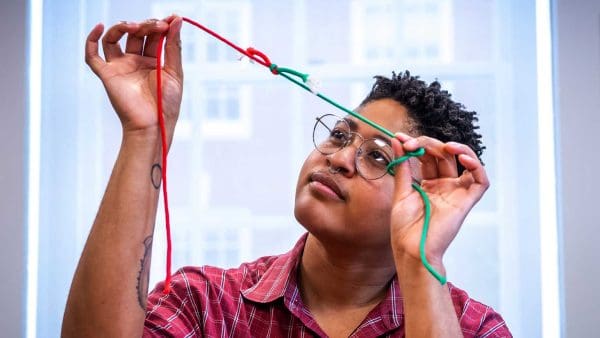Economics graduate student Victor Rondo is examining why women make less money than men, and his research has taken some unexpected turns.
I was nearing the end of my second year toward a PhD in economics and starting to think about independent research, when an opportunity came my way that piqued my interest and made me realize that you can go in one direction with research and end up in an entirely different place than you expected.
Nicholas Papageorge, an assistant professor in the department, approached me one day and started talking about an idea he and one of his colleagues had about how to break open the issue of gender inequality when it comes to salaries. What if, he asked, the inequality could be traced back—way back—to how kids behaved in the classroom? I was intrigued.
So far, I had spent much of my doctoral study looking at child-development literature. I was curious about why some children are smarter and behave in different ways than others. I was also fascinated that so many adult outcomes can be explained by skills and behaviors they learned in childhood. In fact, my own dissertation focuses on the role of parents in shaping their children’s skills and behaviors. The idea Dr. Papageorge was proposing seemed related to my own work, and I quickly told him to count me in.
In our research, we proposed that gender differences in classroom misbehaviors during childhood could explain the well-known but puzzling gaps in educational attainment and late-life earnings between men and women. Today, about 60 percent of college students are women, and women earn about one-third more undergraduate degrees than men, yet women are paid on average only 77 percent of what men are paid.
We knew that differences in what is called cognitive ability—such as math and reading test scores—could not explain the distinct gaps. If women had higher cognitive ability, they would perform better in school and in the labor market and likely enjoy higher earnings. Some researchers say gender differences in traits other than cognitive ability, such as behavioral ones, could explain the educational gap. But their research did not address the traits we thought were important, and they don’t explain the earnings gap. Could the gaps be traced back to early classroom days?
Very little information exists that links classroom behavior of children to earnings in adulthood. One exception, though, is a British study that followed a large number of children born in Britain in 1958 through adulthood. This seemed like a good place to start, as the study asked each student’s teacher questions about their behavior in school; questions that had not been asked in other surveys. And the study gave us recent information about their earnings as adults.
We found that our initial idea was both right and wrong. We did find that boys are relatively more likely to misbehave in the classroom than girls. We also confirmed, as expected, that misbehaving children had a harder time achieving higher levels of schooling. What was surprising, though, is that misbehaving children were receiving higher earnings than their well-behaved counterparts. This went against all we had seen in previous literature about classroom misbehavior. Contrary to our initial hypothesis, however, the misbehavior could not explain the gender earnings gap, as we saw that it was associated with a higher increase in earnings for women than for men.
Even though our results did not support our original hypothesis, they suggest that the educational system penalizes certain behaviors that are actually valued in the labor market. Now we had a whole new avenue of research to explore. We used these results to write a paper that looked at the mismatch that exists between the educational system and the labor market. We showed that policies aimed at suppressing misbehavior in school can actually hurt children in the long run. And supportive, student-teacher interventions aimed at reducing misbehavior can benefit children in school and later on in the labor market.
I am now working on a paper that will complement the British study; it explores how childhood misbehaviors are linked to adult outcomes in the United States. The results are still preliminary but seem to show a link between classroom misbehavior, the criminal system, and adult earnings. Also, since race and socioeconomic status are linked to criminal outcomes, the connection between childhood misbehavior and adult earnings depends on one’s race and socioeconomic group. The main finding so far is that classroom misbehavior hurts African-American children more than whites and Latinos, leading to greater risk of school suspension and incarceration as they become young adults.
I can’t tell you what this research will uncover next, but hopefully one day it could play a role in school or policy reform. In the meantime, I’ve learned one of the basic premises of research: be ready for the unexpected.




